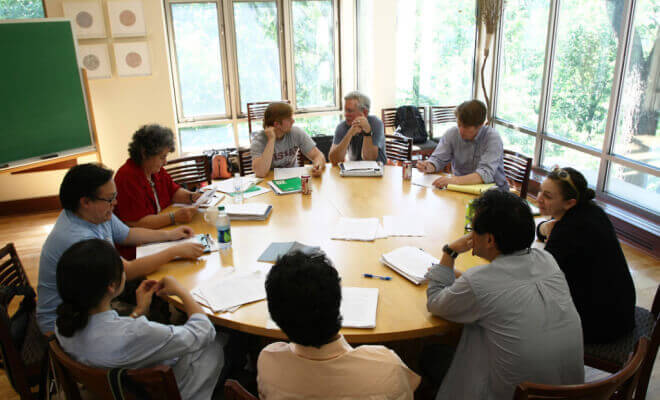I sat down in my first creative writing workshop, astounded at the small room of students around me, overwhelmed by the course packet sitting in front of me, and forgetting the difference between poetry and prose. I struggled with the choice to bring out my notebook and a pencil or pull out my laptop; what was the protocol? Later I learned that there was none. You could write on an old napkin or a perfectly edited Word document, and both were okay. Creative writing workshops are not like a 200-person environmental studies lecture where you can sit on your phone, snapchatting your friends for the 50 minute session (no offense). These workshops are tireless effort, constant critique and intense focus on not just the level of writing exhibited but, more importantly, the level of improvement shown over the course of a semester. Creative writing courses, unlike almost any other class in the university system, evaluates students on these efforts instead of a test score.
Learning from New Experiences

Creative writing workshops are classes in which anywhere between around 6-20 students read, write and critique creative writing pieces from their peers in the hopes of improving their writing. “They have made me better at giving new things a chance. As a millennial, we have so much choice in content and we can just change the channel if there’s a song we don’t like, but working with other people means seeing the good and bad and working to make the good better and eliminating the bad. That is a great perspective to take when looking at other people, or our lives in general,” UW-Madison alumna Aarushi Fire said. Students not only learn the necessity of hard work and communication, but how to care about the work they accomplish.
Click here to check out the Top Schools for Aspiring Writers and try out your first creative writing workshop.
The Difference between Apathy & Fear

Learning the difference between apathy and fear plays a huge part of these workshops as well. One of the most influential instructors in my own life at UW-Madison encouraged his students to “bring it” to every workshop. “My first workshop teacher, Josh Kalscheur, influenced me the most. We had fun during every class, but I could always see how much he truly wanted all of us to grow as writers. He taught me how to expand my thinking in so many ways,” UW-Madison junior Madeline Heim said. Expansion of thinking, defining the gap between fear and lack of ambition, and understanding the ways in which workshops influence our thought processes help every part of our education program.
Carrying over the Values of Workshop

Carrying over these values of hard work and communication to other classes, relationships and projects became one of the most repetitious lessons as well. It is because of instructors like Kalscheur that creative writing workshops help students in every facet of their lives. Fellow professor UW-Madison Mary Fiorenza encourages her students regardless of their major, background or passion for writing to learn one thing in her workshops. “This is a place where it is okay for students to fail. I expect them to try again and I will help them to learn from that failure, but so often students are afraid to try things because of failure. But here, it is okay to fail, sometimes failure is good,” Fiorenza said. Becoming acquainted with failure is one of the most important and most difficult lesson to take away from these workshops.
Learning How to Fail

Lessons distinguishing the difference between failure and a lack of ambition not only allow students to learn from mistakes but see the way that life functions in the real world. These workshops not only teach learners about the foundations that a good scholar carries with them, but a good person as well. “Humility, to me, is the number one trait I see in promising young writers. There is always more work to be done, whether it’s revision or moving on to the next poem, story or essay. It’s the mindset I try to keep as a writer, so I expect it of my students as well,” instructor and fellow Kalscheur said. By allowing young writers to learn in an environment that feels welcoming, while still holding them to the same standards as seasoned authors, these workshops provide unique opportunities to learn, expand and explore your own identity through your writing.
Bottom line: whether you’re interested in writing or not, a creative writing workshop will do wonders for your academic presence, your communication skills and your character. When people view creative writing as an “easy major” that takes little work, they fail to see that this ease with which these writers carry themselves is only possible because of years of work on their writing, and improvement on their personal character to become the authors, poets and playwrights that make our world entertaining. “I honestly struggle to think of any ways that a workshop hasn’t made me a better student. I think every student, no matter their major, should consider taking a creative writing workshop. It improves your writing, your thinking and how you treat your work and the work of others. You learn how to push yourself at times, pace yourself at other times and create something that you’re really proud of. And to me, that’s incredibly valuable.” Heim said. So, what will it be–fiction or poetry?



















